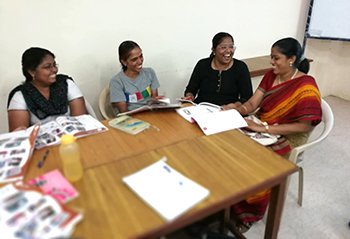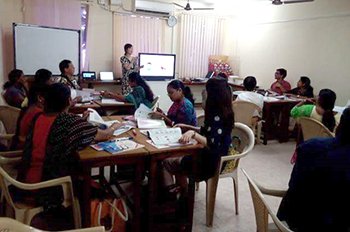2018 Japanese-Language Assistants’ Report: Japanese-Language Education in South India
The Japan Foundation, New Delhi (South India)
NAKAYA Kanae
It has been a year since I was dispatched to the Japan Foundation, New Delhi as a Japanese-Language Assistant (hereafter referred to as "Assistant"). However, I am not in New Delhi, but in Chennai, the fourth largest city in India, in South India. The office of Japanese-Language Specialists for South India is located in a room of the ABK-AOTS Dosokai, a Japanese-language school here in Chennai, and is staffed by a Japanese-Language Senior Specialist (hereafter referred to as "Senior Specialist") and an Assistant. Chennai is one of the most popular cities in India for Japanese-language education, with a diverse range of learners, including those who aim to work for IT companies and other Japan-related companies, and those who started studying because of their interest in Japanese anime and TV dramas.
It is the first time that an Assistant has been sent to South India. Previously, a Senior Specialist had been working here alone. I would like to introduce some of the tasks performed by the Assistant, mainly in Chennai.
Aiming to Be a "Non-teaching Teacher"
Most of the Japanese-language teachers in Chennai are housewives or office workers who teach Japanese as volunteers. In an environment where Japanese-language teaching is not yet established as a profession, it is difficult to train teachers, but one of the missions of the Assistant is to support local teachers in improving their Japanese-language skills.
I am in charge of the Brush-up Course, a Japanese-language class for local Japanese-language teachers. The course, which used to use "Minna no Nihongo," is now using the textbook "Marugoto: Japanese Language and Culture" (hereafter referred to as "Marugoto") developed by the Japan Foundation.
In Chennai, which has a strong conservative atmosphere, teachers with a lot of "knowledge" tend to be considered the ideal. It seems that it has been difficult for the teachers to get used to the teaching method of Marugoto, which leads learners to make realizations rather than "teaching" them, and at first I felt that there was some resistance to using Marugoto.
However, recently, due in part to the activities to date of Senior Specialists, we have seen a move toward the active use of Marugoto. I think it is even more important to review the conventional view of teaching and to propose new methods of teaching Japanese language than it is to improve teachers' ability to use Japanese. What I enjoy most through my classes is to see not only the improvement in their Japanese proficiency but also their mind and classes by experiencing new teaching methods and studying sessions related to Marugoto.

A workshop to learn how to use Marugoto
What is "Support for Japanese-Language Education"?
The Assistant position in South India is rare in that I can learn the job of Japanese-language adviser under the guidance of a Senior Specialist. In addition to teaching in front of learners in the classroom, I also visit Japanese-language educational institutions to observe classes, gather information, give advice, give speeches at Japan-related events, and can be involved with a variety of people.
Up until now, as a Japanese-language teacher, I had only thought about teaching Japanese to the students in front of me in the classroom, but now I am gaining experience in supporting Japanese-language education in a different way by learning about remote seminars using the Internet, video editing, and public relations.
In addition to Chennai, I also accompany others on business trips to Bangalore, Hyderabad, etc., where I give workshops and practical reports, promote Marugoto, and provide support for Japanese-language education in various ways. Through these experiences, I have been able to see a world that I did not know of when I was only in the classroom, and I have been able to view Japanese-language education from a larger perspective.
During the past year, under the guidance of a Senior Specialist, I have been providing support for Japanese-language education from multiple perspectives, using a variety of techniques and means. Everything is new, and there are many things that go right and many things that go wrong, but little by little, I feel that Japanese-language education in South India is changing.
There is just a small number of people running our operations in South India, but with the help of local teachers, learners, and Japanese people living in Chennai, I think it is a place full of potential for even greater things. With the support of the people around me, in the future I would like to boost Japanese-language education, not only by teaching Japanese directly, but also by taking on the challenge of creating various systems to do that.

A seminar held in Chennai
- What We Do Top
- Arts and Cultural Exchange [Culture]
- Japanese-Language Education Overseas [Language]
- Japanese-Language Education Overseas [Language] Top
- Learn Japanese-language
- Teach Japanese-language
- Take Japanese-Language Test
- Know about Japanese-language education abroad
- The Japanese-Language Institute, Urawa
- The Japanese-Language Institute, Kansai
- Japanese-Language Programs for Foreign Specified Skilled Worker Candidates
- Japanese Language Education for Japanese Children Resident Overseas and for the Descendants of Migrants
- Archives
- Japanese Studies and Global Partnerships [Dialogue]
- JF digital collection
- Other Programs / Programs to Commemorate Exchange Year
- Awards and Prizes
- Publications
